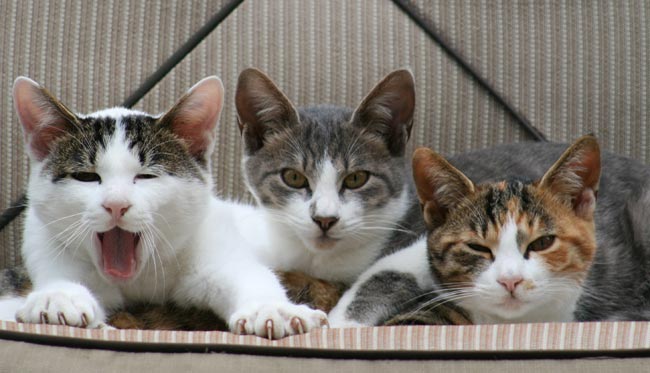Rabid Cats on the Rise

WASHINGTON (ISNS) — In a warning to cat owners, the Centers for Disease Control and Prevention in Atlanta, GA, said new data shows that the number of reported rabies cases among cats increased by 12 percent in 2008 compared to 2007.
“While dogs have historically been associated with rabies transmissions to humans, cats are the animal most likely to expose a human to rabies,” the CDC said in a feature on its website. “Cats are often in close contact with both humans and wild animals, including those that primarily transmit rabies. This creates a situation in which rabies may be more easily transmitted to humans from cats.”
In looking for a reason for the rise in cat rabies, the CDC noted that, “cat owners might not be as likely to visit a veterinarian’s office, where they can receive shots that can keep their cat safe from rabies.” The CDC cited data from the American Veterinary Medical Association that “indicates that more than 36 percent of U.S. cat-owning households did not visit a veterinarian in 2006.” That is more than double the percentage of dog-owning households that didn’t visit a vet.
Feeding Time Important with Breast Milk
The composition of breast milk changes significantly to fit the needs of a baby over a 24-hour period, so mothers should not express breast milk at one time and use it at a different time, according to a new study by Spanish researchers.
Milk expressed in the morning typically contains nucleotides and other ingredients that excite a baby’s central nervous system, while milk expressed at night has a different combination of nucleotides that promote relaxation and sleep, the scientists found.
“It is a mistake for the mother to express the milk at a certain time and then store it and feed it to the baby at a different time,” said Cristina Sanchez, a researcher at the chrononutrition laboratory at the University of Extremadura, in Badajoz, Spain.
Get the world’s most fascinating discoveries delivered straight to your inbox.
Sanchez, in a new study published in the journal Nutritional Neuroscience, collected breast milk expressed over a 24-hour period from 30 women. The highest nucleotide concentrations were found in the night-time samples (8 p.m. to 8 a.m.), which, Sanchez said, “made us realize that milk induces sleep in babies.”
You wouldn’t give coffee to someone at night, she said, “and the same is true of [breast] milk. It has day-specific ingredients that stimulate activity in the infant, and other night-time components that help the baby to rest.”
Overconfidence as an Evolutionary Strategy
Confidence is a good thing for achieving success at work, playing sports, and even in combat, but the role overconfidence plays in human behavior can be both good and bad.
A mathematical model developed by two researchers to determine the role overconfidence plays in human behavior shows it can increase ambition, resolve, morale and persistence, all of which helps an individual achieve a goal. But according to the researchers, Dominic Johnson of the University of Edinburgh, Scotland, and James Fowler at the University of California, San Diego, too much overconfidence can lead to arrogance, which in turn can cause “market bubbles, financial collapses, policy failures, disasters, and wars.”
The model shows that overconfidence increases with the magnitude of uncertainty faced by an individual. And, according to the model, overconfidence rules the emotions when the value of the prize is perceived to be much higher than the cost of competing. Thus, according to the researchers, overconfidence is evident in such fields as international relations and the banking industry. But in those domains it can lead to war or the collapse of Wall Street.
While those events are viewed as bad, the model suggests that in a high-stakes game for a valuable prize, overconfidence is often the best strategy. Though overconfidence can lead to disaster, many times the overconfident person wins, beating out the less confident person.
The researchers note that “the fact that overconfident populations are evolutionarily stable may be one reason why overconfidence persists today in politics, business, and finance, even if it causes occasional disasters.” The unpublished research was posted in an online research archive.
This article is provided by Inside Science News Service, which is supported by the American Institute of Physics.
 Live Science Plus
Live Science Plus





